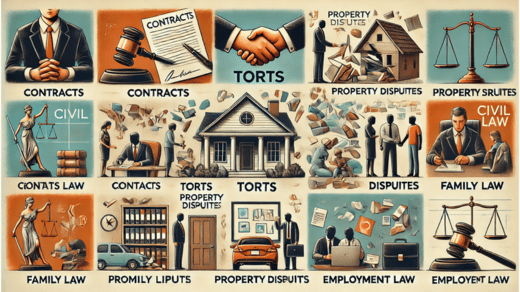1. What is civil law?
Civil law refers to the body of law that deals with disputes between individuals or organizations, usually involving private rights rather than criminal matters.
2. How does civil law differ from criminal law?
Civil law resolves disputes between parties and seeks compensation, whereas criminal law addresses offenses against the state and seeks punishment.
3. What are some common types of civil law cases?
Common cases include contract disputes, property disputes, personal injury claims, family law, and employment disputes.
Read Also:
- https://insightfullawhelp.com/25-common-misconceptions-about-civil-law-explained/
- https://insightfullawhelp.com/30-essential-facts-you-should-know-about-civil-law/
- https://insightfullawhelp.com/40-important-civil-law-questions-answered-by-experts/
4. Who are parties in a civil case?
Plaintiff or person filing the lawsuit; Defendant or person being sued.
5. What is the standard of proof in civil law?
The standard is “preponderance of evidence,” which means it is more likely than not that the claim is true.
6. What remedies are available in civil law?
Remedies are monetary damages, specific performance, injunctions, and restitution.
7. What is a civil lawsuit?
A legal action brought by one party against another to settle a private dispute.
8. What happens if someone loses a civil case?
The losing party may be liable to pay damages, follow court orders, or meet specific obligations.
9. Can a civil case become a criminal case?
Yes, if the behavior constitutes a criminal offense, it can have the effect of a separate criminal prosecution.
10. How long does a civil case take?
It depends on the complexity; cases can run from a few months to several years.
11. Do I need a lawyer for a civil case?
It is not necessary, but an attorney will much more likely dramatically enhance the chances of success.
12. What is a statute of limitations in civil law?
The time frame in which a case must be filed, and varies depending on the type of case and jurisdiction.
13. Are civil cases resolved in court?
Most civil cases are settled, either through a settlement or an alternative dispute resolution, such as mediation or arbitration.
14. What is discovery in civil law?
A pre-trial procedure by which parties exchange information and evidence to prepare for trial.
15. What is a breach of contract?
Failure to perform any term of a contract without a legitimate legal excuse.
16. What is tort law?
A branch of civil law that addresses wrongs causing harm or injury, such as negligence or defamation.
17. What is a civil trial?
The case is presented before a judge or jury, with both sides providing evidence and arguments, followed by a verdict.
18. What is a civil judgment?
It is a ruling in a court in a case filed under a civil case; the outcome with all obligations regarding parties.
19. Can a judgment in civil cases be appealed?
Yes. There is the chance to appeal when one is sure legal mistakes took place during trial; judgment
20. What is mediation under civil law?
It is where an independent mediator aids the disagreeing parties reach a mutually agreed agreement out of court.


